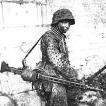Hanny
Posts: 422
Joined: 7/5/2011
Status: offline

|
quote:
ORIGINAL: Zug
I don't think the OP is asking about frontage, but the distance between the opposing forces, the no man's land, which could be as close as a few feet, just on the other side of the rail embankment. I'd reckon the heavier the terrain the nearer the lines as a rule.
You may be right. If so, its still a how long is a piece of string question, at some points in Stalingrad contest, the front line ran through a house with each side in different parts of the house. When a German ID was brought into the Ostfront to begin with ( it had been formed and trained in depots, and worked up in a garrison capacity in an occupied nation, before deemed combat ready and sent to an active front) it went to a quite area to finish its readiness for combat, so could be 20klm and outside Art fire from the enemy, it could be inside Art range and as close as the terrain or strategic requirements called for. Static points on the front line could have brought ww1 style trenches into operation and each side as close as 500m.
Terrain considerations would determine how clear a field of fire ( or line of sight to bring in Art/Mtr fire) was from the mil crest and no one would be in too close except to patrol/infiltrate.
_____________________________
To strive, to seek, to find, and not to yield.
|
 Printable Version
Printable Version









 New Messages
New Messages No New Messages
No New Messages Hot Topic w/ New Messages
Hot Topic w/ New Messages Hot Topic w/o New Messages
Hot Topic w/o New Messages Locked w/ New Messages
Locked w/ New Messages Locked w/o New Messages
Locked w/o New Messages Post New Thread
Post New Thread